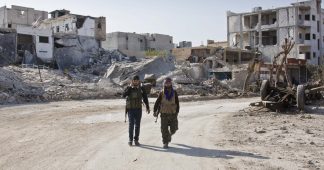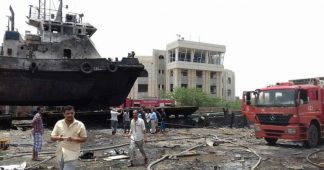The Saudi and UAE-led operation to retake the rebel-held port city of Hodeidah, which could jeopardize the lives of hundreds of thousands of civilians, represents more than the latest tragic chapter in Yemen’s civil war. It is the fully expected outcome of several Western nations’ complicity in a multi-country assault that has made Yemen the world’s largest humanitarian disaster.
The recent attack on Hodeidah is both a function of Western arms support and a feature of longstanding Western political programming that has sustained the coalition’s attack on the country since a bombing campaign began in 2015.
For the last several years the US, UK, and France have all greenlit arms sales, refueling missions, and special forces guidance to the coalition with few, if any, conditions. The operation in Hodeidah is no different, where French special forces are already on the ground and the US is providing intelligence and aerial refueling to assist the coalition. Since the beginning of the Saudi-led campaign in Yemen, the results of American, French, and British arms and support have led to the bombing of funerals, weddings, markets, hospitals, schools and other public spaces populated by civilians. The latest bombing of a wedding party (because there have been more than one) killed twenty, including the bride herself.
Some observers equivocate as to whether these destructive acts stem from purposeful targeting or simply the negligent use of sophisticated Western weapons technology, but the frequency with which non-combatants, civilian production capacity, and food supply chains continue to be struck appear deliberate. To assume these attacks are anything but calculated is to stretch the bounds of reasonableness: within the first day of operations in Hodeidah, a Doctors Without Borders treatment facility suffered a coalition missile strike even though the GPS coordinates of the facility had been providedtwelve times and the roof had clear markings to distinguish the building for medical purposes.
Such missile strikes are as indiscriminate for their attacks on civilians as they are precise in the striking of non-military use infrastructure. These strikes may very well amount to war crimes; war crimes made possible by American, British, and French munitions.
But unfettered access to arms is often only as beneficial as the political arguments that justify their use and here again the US, U.K., and France have proven more than capable to assist. The persistent narrative in Western capitals that Iran lurks behind any and all crises in the Middle East, an attitude further buoyed by the presence of staunch regime change advocates in the Trump administration, affords the Saudi-led coalition the easy political cover to claim Houthi rebels are merely Iranian proxies servicing Tehran’s regional ambitions.
Knowing its audience all too well, as if on cue, Yemen’s government-in-exile rationalized the Hodeidah operation by noting that liberating the port from Houthi control will “cut off the hands of Iran, which has long drowned Yemen in weapons that shed precious Yemeni blood.” While the claim that the Houthi rebels are merely Iranian proxies remains problematic, and has been challenged by experts and government officials alike, the ingrained narrative to see the hidden-hand of Iran as the main driver behind disruptive forces in the Middle East makes it increasingly difficult to question the Arab coalition’s ration d’état for attacking Yemen.
With such military support and political cover from Western countries why would Saudi Arabia, UAE, and other members of the coalition believe anything but the acceptance of their military operations in Yemen?
Western officials may at times express concern and beseech the coalition to show restraint, but in the end arms continue to flow and political acquiescence persists, as recently demonstrated by the American and British rejection of a UN security council resolution calling for an end to hostilities in Hodeidah. This is not to deny how Houthi actions have added to the civilian death toll by the firing of artillery into Yemeni cities, use of landmines, and arbitrary jailing of activists and journalists. Rather it is to recognize the willingness of Western countries to back a coalition that remains the leading cause of civilian and child casualties in the conflict through its use of disproportionate and indiscriminate violence toward anyone in its way. With Western support, Yemeni suffering is made easy.
The statistics of Yemeni suffering – 22 million in need of humanitarian aid, 60% of the population being food insecure, and one million people affected by a cholera outbreak – are so numbing as to create a loss of feeling, but it does not seem to matter. The abundance of warnings about the damage of ongoing bombing in Yemen and the Hodeidah operation- by the UN, aid organizations, and even half-heartedly by the same Western countries who support the coalition’s mission- is so widespread, but it does not seem to matter.
While the U.S., UK, and France may have felt the moral obligation to intervene in Syria after a ghastly chemical attack, Yemenis are not afforded the same protection for their suffering. UK Prime Minister Theresa May, for example, justified the Syrian strikes by noting “we have done it because we believe it was the right thing to do” and, yet, since the beginning of the Saudi-led campaign in Yemen UK arms sales to Saudi Arabia have increased 500 percent.
The complicity of the US, UK and France in Yemen’s destruction carries on in Hodeidah. Only the extent of Yemeni suffering remains unclear. Undoubtedly clearer is that for those countries who choose to militarily support and politically abet the bombing of the Middle East’s poorest country, the windfall from arms sales and wishful thinking about regional dynamics matters significantly more than Yemeni lives.
Published at https://www.counterpunch.org/2018/06/27/yemeni-suffering-made-easy/











